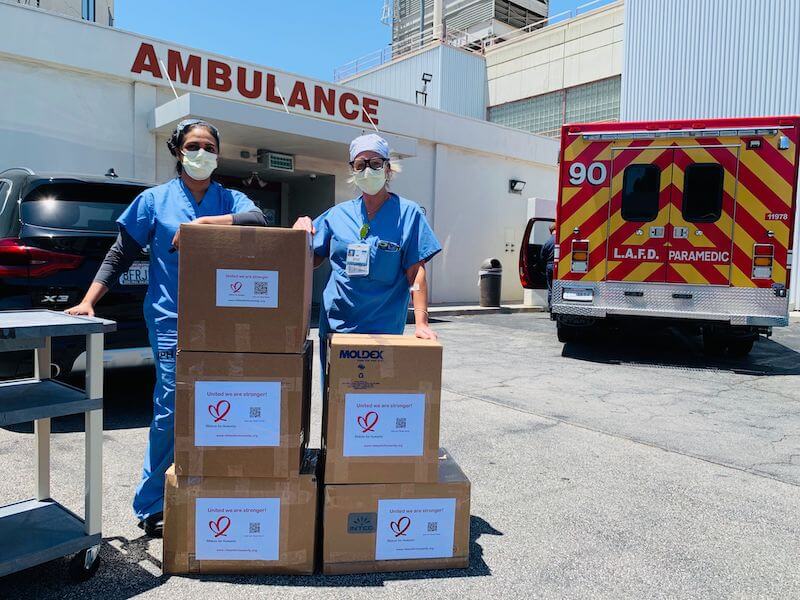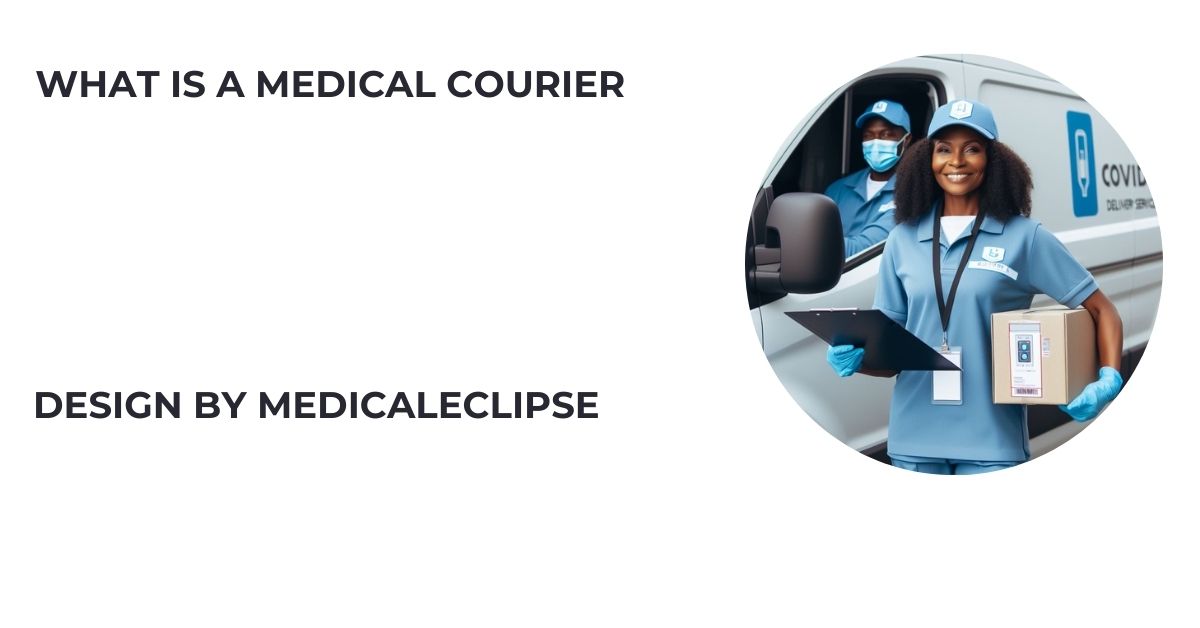A medical courier transports medical items like medications, lab specimens, and equipment safely and on time, supporting healthcare operations.
In this article, we’ll explore the important role of a medical courier, highlighting what they do, the skills needed, and why their work is crucial in the healthcare system.
Key Responsibilities of a Medical Courier:

The primary responsibility of a medical courier is to ensure that medical items are delivered to their intended destinations quickly, efficiently, and safely.
Some of the specific items they transport include:
- Medical specimens: Lab samples, blood, urine, tissue samples, and other biological specimens need to be transported to laboratories or testing facilities for analysis.
- Medications: Prescription drugs, including controlled substances, and life-saving medications, are delivered to pharmacies, hospitals, or directly to patients.
- Medical equipment: From surgical instruments to monitoring devices, medical couriers ensure that essential equipment reaches the appropriate medical facilities.
- Medical records: Confidential patient information, including medical records, must be delivered safely while adhering to regulations such as HIPAA to protect patient privacy.
Medical couriers must be trained to handle these items properly. For example, some medical items, like lab specimens, need to be kept at specific temperatures, while medical equipment may need to be handled with extreme care. Timeliness is another critical factor in their responsibilities, as delays can jeopardize patient safety and the effectiveness of medical treatments.
Why Are Medical Couriers Important?
Medical couriers are an essential link in the healthcare supply chain. Their work directly impacts the healthcare industry’s ability to deliver care and make timely decisions. Some of the reasons why medical couriers are so important include:
- Ensuring Timely Deliveries: Delays in the delivery of medical specimens, medications, or medical records can disrupt treatment plans, delay diagnoses, or even cause harm to patients. Medical couriers ensure that critical materials reach their destination on time.
- Handling Sensitive Materials: Many medical items are sensitive and require careful handling. From blood samples that need to be kept at specific temperatures to medical records that need to remain confidential, couriers must ensure that items are transported in compliance with industry standards and regulations.
- Supporting Healthcare Operations: By providing a reliable delivery service for hospitals, labs, and clinics, medical couriers help to keep healthcare operations running smoothly. They facilitate the delivery of necessary supplies, freeing up medical staff to focus on patient care rather than logistical tasks.
- Legal and Regulatory Compliance: Medical couriers must be familiar with the regulations surrounding the transportation of medical items. They need to comply with laws governing the transportation of hazardous materials, prescription medications, patient records, and biological specimens. In the case of pharmaceuticals, for instance, there are strict rules for temperature control and security during transportation.
Also Read: What Is an Optometrist?
Skills and Qualifications of a Medical Courier:
Being a medical courier requires a unique combination of skills and qualifications. Some of the key traits that make a successful medical courier include:
Attention to Detail:
Medical couriers must ensure that each item is handled with care according to its specific needs. This includes confirming that medical specimens are transported to the correct lab and ensuring temperature-sensitive medications are kept within the required range. Small mistakes can lead to compromised patient care, so accuracy is crucial at every step. A thorough understanding of the handling requirements of various medical items ensures the safety and effectiveness of deliveries.
Time Management:
Deliveries are often urgent, requiring couriers to meet strict deadlines. Whether it’s an emergency medication, critical test results, or vital medical equipment, they must be punctual to prevent any delays in patient treatment. Medical couriers often navigate tight schedules, working under pressure while ensuring timely deliveries. Excellent time management ensures healthcare operations run smoothly and that no critical delivery is missed.
Knowledge of Regulations:
Medical couriers must be well-versed in the legal and regulatory frameworks for transporting medical goods. They need to be aware of the rules for handling hazardous materials, temperature-sensitive medications, and confidential medical records. Compliance with regulations like HIPAA is essential to protect patient privacy and maintain safety. Their knowledge ensures they avoid legal issues and handle materials with the utmost care, safeguarding public health.
Clean Driving Record:
Medical couriers drive vehicles to transport medical items, making a clean driving record crucial for safety. They must adhere to traffic laws while navigating busy roads, especially when carrying expensive or sensitive items. A valid driver’s license and a good driving history are essential for the smooth operation of the courier service. Maintaining safety on the road is paramount to avoid accidents that could damage critical medical supplies.
Customer Service Skills:
Medical couriers interact directly with healthcare professionals and patients, requiring strong communication and customer service skills. They must update healthcare providers on the status of their deliveries and ensure that all interactions are professional and respectful. Understanding the urgency of each delivery and being responsive to the needs of the healthcare team is crucial. Excellent customer service helps build trust and ensures that medical professionals receive timely, reliable support.
Types of Medical Courier Services:

Medical courier services can vary widely depending on the needs of the healthcare facilities they serve. Some common types of services include:
- Same-Day Delivery: Many medical items, such as urgent lab samples or life-saving medications, require same-day delivery. Medical couriers specializing in this type of service are expected to respond quickly and provide fast, reliable service to meet tight deadlines.
- Scheduled Deliveries: Routine deliveries of medications, medical supplies, or medical equipment to healthcare providers, clinics, and pharmacies often follow a pre-determined schedule. Medical couriers ensure these deliveries are made on time and at regular intervals.
- Specialized Deliveries: Some deliveries require specialized handling. For example, organ transplants or blood products must be transported under strict temperature controls and with added security. These types of deliveries require couriers with specialized training and equipment.
- Emergency Services: During critical situations, like a medical emergency or when essential equipment or medicines are urgently needed, medical couriers provide expedited services to ensure that health professionals have the resources they need in a timely manner.
Technology in Medical Courier Services:
In today’s digital world, technology plays an increasingly important role in the medical courier industry. Many couriers use mobile apps and GPS tracking systems to provide real-time updates, optimize delivery routes, and ensure the safety and security of sensitive items.
Additionally, online platforms help manage customer orders, track deliveries, and maintain a detailed history of each transport, improving overall efficiency and communication between couriers and healthcare providers.
Also Read: What Is Botox and How Does It Work?
Challenges Faced by Medical Couriers:
While the work of a medical courier is rewarding, it can come with its challenges. Some of these include:
- Time Pressure: Medical couriers often work under time-sensitive conditions, which can be stressful, especially when handling emergency or high-priority deliveries.
- Weather Conditions: Extreme weather can sometimes delay deliveries, especially if the courier must navigate through adverse conditions, such as snow or heavy rain.
- Regulatory Compliance: Medical couriers must stay up to date with changing healthcare regulations and ensure they comply with every law governing the transport of medical materials.
- Security Concerns: Certain deliveries, such as high-value pharmaceuticals or sensitive patient records, require extra security to prevent theft, loss, or misuse.
FAQ’s
1. What does a medical courier do?
A medical courier transports medical items like medications, lab specimens, and equipment to healthcare facilities, ensuring timely and secure deliveries.
2. Why are medical couriers important?
Medical couriers ensure that critical medical supplies and information reach their destinations on time, preventing delays in patient care and diagnoses.
3. What skills are needed to be a medical courier?
Attention to detail, time management, knowledge of regulations, a clean driving record, and excellent customer service skills are essential.
4. What types of deliveries do medical couriers handle?
Medical couriers handle same-day deliveries, scheduled deliveries, specialized deliveries, and emergency services, depending on the urgency and type of medical item.
5. What challenges do medical couriers face?
Medical couriers face time pressure, weather-related delays, regulatory compliance issues, and security concerns, especially when handling sensitive or high-value items.
Conclusion
A medical courier ensures the safe, secure, and timely delivery of medications, lab specimens, medical equipment, and records. Their work supports healthcare providers in delivering quality care by keeping vital supplies moving efficiently. Navigating complex regulations and tight deadlines, medical couriers play an indispensable role in maintaining the healthcare system, offering a rewarding career that impacts patient care directly.

Leave a Reply